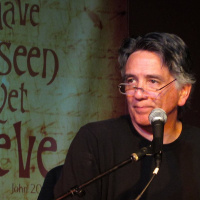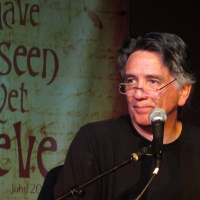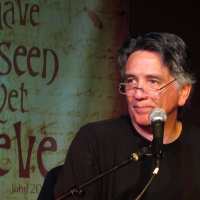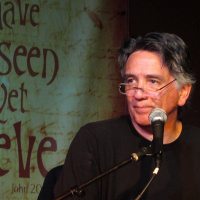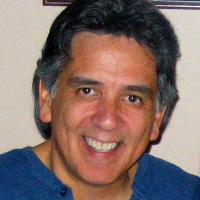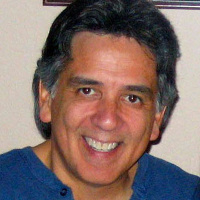David Brisbin Podcast
- Author: Vários
- Narrator: Vários
- Publisher: Podcast
- Duration: 324:03:29
- More information
Informações:
Synopsis
Audio podcasts delivered at theeffect church in San Clemente, CA. theeffect is a community of imperfect people working together to find the emotional recovery and spiritual transformation that is theeffect of Gods love by unlearning limiting perceptions, beliefs, and compulsions, and engaging a first century Jesus in a non-religious and transforming way. See more at theeffect.org.
Episodes
-
Only A Mother Could Love
06/05/2016 Duration: 45minDave Brisbin | 5.8.16 On Mother’s Day, we look at the role of mothers and fathers in ancient Hebrew society as illustrated in the language itself. Father in Hebrew means “strong house” and mother means “strong water,” that when understood in context means the “glue that holds the family together.” Strong house and strong water speak to the necessity of both doing and being, of accomplishment and relationship that undergird human life as a whole. We won’t find meaning and purpose without both father and mother in our lives, and we won’t find God either. God is neither masculine nor feminine and is both at the same time. Hebrews understood that their God carried the qualities of strong house and water in perfect balance, and that though God as king was indeed the strength of the house, we always experience him first as mother—the compassion, mercy, and wisdom of the glue that holds everything together. That Jesus always led every encounter, every relationship with compassion and mercy shows us the Way of God, l
-
Waking
23/04/2016 Duration: 47minDave Brisbin | 4.24.16 Continuing to look at the method and approach to spirituality at theeffect, one of the hallmarks is the contemplative life and contemplative prayer. How to understand contemplation? Simply stated, it’s the letting go of habitual thoughts, feelings, and behavioral patterns, letting of what we think it means to be ourselves, our ego-self in favor of what really is here and now present in the form of God’s spirit. What does that feel like? It feels like waking up inside your dream, to realize you’re dreaming, that the dream isn’t real, and that you can make a different choice than the one your habitual thoughts and triggered feelings have always dictated. How do we do this? Through contemplative prayer and practice, the constant practice of presence, stepping away from all our mental activity to find that Paul called prayer without ceasing, not unceasing words, but the unceasing presence and awareness of someone who has awakened in waking life.
-
About Participation
15/04/2016 Duration: 53minDave Brisbin | 4.17.16 We continue the thread started in the last message, which summed up the approach of theeffect ministry as working to help each individual find acceptance, get involved, build trust, and live theeffect of God’s love. Now what was that second point, again? Getting involved is really all about participation. Participation in what? Faith? Well, a much better way to put it is that participation is faith and faith is participation. Biblical faith is always action, not thought, but biblical faith is also not obedience. Obedience is not faith because it is based in fear of punishment, and the moment obedience is no longer based in fear of punishment, but love of the one to whom you’re submitted, then obedience is no longer obedience, but the action of trust. How do we get there? By diving into relationship headlong. But then relationship is only as good as our participation in it, so it’s really all about participation.
-
Who, What, Why
08/04/2016 Duration: 47minDave Brisbin | 4.10.16 As we near our ninth anniversary as a ministry, seemed time to step back redefine what theeffect was founded to be and what we work to do each day in the minds and hearts of those with whom we connect. Our approach can be summed up as a working to help each individual find acceptance, get involved, build trust, and live theeffect of God’s love. That love, the Good News, Kingdom, the quality of life lived steeped in the awareness of and participation in the Father’s presence is theeffect we seek and without which there is no purpose to a spiritual life.
-
Least Of These
19/03/2016 Duration: 53minDave Brisbin | 3.20.16 On Palm Sunday, we look again at our expectations and biases and try to pry loose all we think we know of Jesus: from what he looks like to what we believe of his mission and teachings to test whether we, like those greeting Jesus along the streets of Jerusalem would miss the moment of our visitation. What we think we know limits what we see and are willing to accept as truth. Jesus rides into our lives on the back of the foal of a donkey, bringing a message and truth that unless we have conditioned ourselves to see with the eyes of a child, we will miss completely.
-
Choosing Sides
05/03/2016 Duration: 43minDave Brisbin | 3.6.16 As we look at religion and church practice, it all looks so polarized, so black and white, right and wrong—so binary, as if all our spirituality comes down to a choosing of sides. Which side is right and has the power to save and which does not. A young poet writes about why he hates religion and lists all the evils for which religion is responsible. Religion is bad; Jesus didn’t do religion; Jesus ended religion. Really? Jesus didn’t do religion? Truth is, Jesus was more religious than most of us could ever imagine or approve. He followed the written tenets and practices of his faith to the letter, but within that practice, he cleared a path to the freedom that actually fulfilled the intent of his religion. Jesus didn’t choose sides, and though he revered and followed his religion, he never put mere religious practice above the pure relationship his religion was meant to convey. When we study Jesus carefully, better, when we live Jesus carefully, we realize it was never about choosing s
-
Accepting The Ride
27/02/2016 Duration: 48minDave Brisbin | 2.28.16 James Series 8: In this final session on the book of James, James makes the transition from more commentary on harmful practices and attitudes among those in his community—speaking ill of each other, arrogantly believing one’s own capacity to control circumstances independently of God, swearing—back to prayer and submission to God. And in this transition, he comes full circle from the acceptance of life’s difficulties and challenges with which he began, to the acceptance of our most basic relationship with life. From the endurance created by accepting life challenges and working through them to the realization and acceptance of our complete dependence on God for the life we lead. From acceptance to acceptance. James has taken this journey himself, and he is inviting us to take the journey as well. Only one question remains: we will accept the ride?
-
Falling Rules
20/02/2016 Duration: 52minDave Brisbin | 2.21.16 James Series 7: James continues to hammer on the theme of making our actions match the ends we seek in Kingdom. He points to counter-kingdom practices and action he witnesses in his community—the fights, quarrels, covetousness—and harshly admonishes his people. But again, we need to resist the temptation to just see more rules to follow here. James tells us to draw near to God, humble ourselves, submit, and allow ourselves to let go and descend into a kind of mourning, a sense of loss of all the things we held dear in order to find what is really dear in life. We have built the idea that kingdom is achieved by following rules, when what Jesus and James are telling us is that kingdom is realized by falling in love—in love with a life that looks like kingdom, so that our behavior matches the kingdom we seek. We need to let the rules fall away so we can fall…into the embrace of the Father.
-
Starting With Heaven
13/02/2016 Duration: 47minDave Brisbin | 2.14.16 James Series 6: Continuing to develop his theme of the law of liberty, James is determined that we understand how fully becoming the law as Jesus framed it—the fulfilling of law as opposed to mere rule following—was the embodiment of faith. His famous passage about the power of the tongue comparing it to rudders on ships and bits on horses is a colorful way of restating Jesus’ teaching that it’s not what goes into man that defiles him, but what comes out. It’s tempting to see these admonitions as more rules to follow, but James is trying to convey that we must use the same means as the ends we seek. If we wish to live in the unity of the Father, then we must begin practicing that unity and connection first. Sounds like a catch-22, but only if you think of heaven, understood as God’s ultimate acceptance, as the end of the journey. What if, as Jesus says, the kingdom, God’s acceptance and love is already within? What if heaven isn’t the end of the journey, but the beginning? That would be
-
Law Of Liberty
06/02/2016 Duration: 44minDave Brisbin | 2.7.16 James Series 5: James launches into another major theme of his book, the law of liberty. At first glance, his phrase seems to be an oxymoron—joining two completely contradictory terms. Isn’t law the opposite of liberty? But its very definition, law limits and restricts freedom for the greater good of the group. So what is a law of liberty? James speaks of being a doer of the word and not just a hearer, that action is necessary, that hearing without doing is just another way of saying faith without works is dead. James is zeroing in on the essential point that though law as we understand it, restricts, and such law is not what Jesus or James are teaching. When we follow a law with which we have no connection in terms of purpose and highest good, then our freedoms—things we desire to do--are restricted, but when our purpose and highest good in life has become the same as the law’s purpose and highest good, then in what way are we any longer obeying? We and the law have become one and what
-
Changing Form
30/01/2016 Duration: 41minDave Brisbin | 1.31.16 In the aftermath of our good friend, Lenny Rosenbaum’s suicide, we have felt an onslaught of the usual questions, anguish, and second guessing as well as those specific to each of us…depending on our relationships with Lenny, our last contacts with him, and a million other factors. The realization dawns that as long as we draw breath, we will be faced with loss in life—the loss of people and things dear enough to cause the questions and anguish and second guessing. In a very real way, we are defined as a people by how we handle the losses we experience. Facing loss brings our deepest beliefs into question, strips life down to its essence—in effect, shows us what we really believe and trust regardless of what we may say to ourselves and others. What Jesus seems to be telling us in his Good News is that nothing of value is really ever lost--it just changes form. Just as the stars that disappear at dawn are still right where we left them in our blue sky, everything we need and love remains
-
Degreeless Love
23/01/2016 Duration: 50minDave Brisbin | 1.24.16 James Series 4: James was Jesus’ brother or close relative or friend—the language of the New Testament can mean any of the above—and perhaps because of such closeness, James teaches in much the same style as Jesus. In the Sermon on the Mount, Jesus begins with the Beatitudes, a picture of the finished product, an end view of the process of kingdom. James also first presents the big, general principles that function the same way. But as does Jesus in the Sermon, James now begins to break down the big concepts into day to day details. How do these principles play out moment by moment? How should we be treating each other in home and synagogue in light of the principles of discernment and judgment? But following the Way is not about following rules, and though James gives us rules, directives for our comportment, he couches it in his concept of the “law of liberty,” a seemingly oxymoronic phrase until you realize that this law is not a law of conformance, but of transformance and moves in
-
Beautiful Irony
09/01/2016 Duration: 44minDave Brisbin | 1.10.16 When a beloved friend and integral member of a community dies, it sends shockwaves through each connected life. But when that friend has taken his own life, the shockwaves compound and merge with deeply human questions and the added remorse and even guilt that frustrates healing both individually and collectively. With Lenny’s Rosenbaum’s death last week, we find ourselves in just such a moment, with just such questions and shock. How could a person like Lenny, who was one of the most intelligent and humorous individuals you could meet, who was a fixture at our gatherings and meetings, always bringing such life to each event have gotten to a point of such hopelessness right under our radar? Is his suicide forgivable by God despite what we may have been taught in our religious circles? How do we move through the grief and pain and perhaps the guilt and remorse as well? The beautiful irony of Lenny’s life is that even though he was the one who has caused our immediate grief, he is also th
-
Full Circle
02/01/2016 Duration: 46minDave Brisbin | 1.3.16 James Series 3: Coming back to the book of James after Christmas and the start of a new year, we are reminded that time, all we know of time, the passage of time, is circular. The only reason we know time is passing is because earth and moon, planets and stars turn in their circles. The movement of circles is the movement of time. Life is circular too—circles within circles, and James’ book, taking us on a journey to define life on Jesus’ Way moves in circles as well. His topics don’t neatly lay out along a straight logical line, but recur in circular patterns. At first glance, it seems chaotic and disordered, but as a metaphor for life, it makes perfect sense. Starting with the initial theme of endurance, the acceptance of life on life’s terms, he moves on to wisdom and faith and then patience: the waiting for completion as a gardener waits for rain and soil to do its work, once all the work he can do is done. The serenity of this kind of patience, rooted in the endurance, acceptance, a
-
No Room At The Inn
26/12/2015 Duration: 36minDave Brisbin | 12.27.15 As Christmas moves into the rearview, there is one more look we should give the birth narratives to see what they may have for us herenow. It’s always the tiny details of a story that give it its authenticity, show that the storyteller was fully present to the moments described. And in Jesus’ birth narratives we have some details that shouldn’t be missed: wrapped in cloths, lying in a manger, no room at the inn. These details have graced millions of nativity scenes for two millennia, but do we have them right? What do the swaddling clothes and manger tell us about our God that we can use to experience him right herenow? And was there really an inn in the way we think of an inn? And if not, what would a more accurate translation tell us about Jesus’ family and our families and character and nature of those, like the Magi, who see through the details to the God they travel so far to worship.
-
The Star Of Bethlehem
12/12/2015 Duration: 41minDave Brisbin | 12.13.16 In the run up to Christmas, one of the more striking elements of the Nativity narrative in the Gospel of Matthew is the story of the Magi and the Star. What was this star and who were these Magi? Was this a miraculous event or the good timing of a supernova, comet, conjunction, or some other celestial event? But if it were there in the sky for all to see, why were the Magi the only ones to see it? Why did Herod and his court have to be informed? And as we examine the possible true nature of the star, what is its significance for us today? Is it just a miracle story foreshadowing the miraculous ministry of Jesus, or is there more? When we look at the nature of the Magi, the lifelong dedication to their astronomical science, their passionate desire for a king who would usher in a new age, their courage in taking the long perilous journey to greet that king…we are still not prepared for their seeming naïve openness in accepting a poverty stricken infant as the figure for whom they worked
-
The Effect Of Endurance
05/12/2015 Duration: 43minDave Brisbin | 12.6.16 James Series 2: James tells us in the opening verses of his book that we should count it all joy when we encounter various difficulties because the testing of our faith produces endurance and the endurance produces a perfect result in which we lack for nothing. James then moves on to talk about asking for wisdom, asking without doubt, persevering to reward, the nature of temptation and presence. If we look at these verses from a Western point of view, we will have a complete misunderstanding of what James is saying in his Eastern way to an Eastern audience. We in the West rely on our eyes rather than our hands looking to form over function; we see life through an intellectual, passive lens rather than an active, experiential one; we see life broken into separate, dualistic compartments and time as a linear segment between endpoints rather an a holistic whole. Unless we can begin to understand that James and his fellows always saw function over form, active experience over passive mental
-
The Beauty Of Brokenness
28/11/2015 Duration: 43minDave Brisbin | 11.29.16 James Series 1: James, the brother of Jesus, the man who led the early Jerusalem church for the first thirty years after the crucifixion was the pillar of the Eastern Church and yet is relatively unknown in the West. Western tradition portrays Peter as the head of the early Jewish followers of Jesus, but the East has always maintained James in that position. The book that bears his name was quite possibly a catechism for early Jewish followers and converts and is beautiful in its clarity and brevity and focus on the big questions as well as the essential details of life. Moving nearly verse by verse, we’ll take a look at how James led his brother’s followers through those first difficult years, trying to follow Jesus’ Way through persecution from both Jewish and Roman authorities. And because of that persecution and the religious and cultural upheaval of trying to follow Jesus and Judaism at the same time, it’s no coincidence that the first issue James addresses is that of suffering—of
-
Falling in Love
21/02/2015 Duration: 41minDave Brisbin | 2.22.15 The Fifth Way Series 12: “Nothing is more practical than finding God, than falling in Love in a quite absolute, final way. What you are in love with, what seizes your imagination, will affect everything. It will decide what will get you out of bed in the morning, what you do with your evenings, how you spend your weekends, what you read, whom you know, what breaks your heart, and what amazes you with joy and gratitude. Fall in Love, stay in love, and it will decide everything.” I think Father Arrupe is dead on here. The Fifth Way is as different from the four ways as falling in love is from following traffic laws or the tax code. Laws and codes may keep us safe and secure, but will never get us to the thrilling, out of control-ness that we really desire in life. If you strip away everything we think we know theologically and legally and religiously, what is left at the bottom of the dogpile is Jesus simply asking us to fall in love as he has fallen in love—with life, with each other, wi
-
Disturbance
14/02/2015 Duration: 47minDave Brisbin | 2.15.15 The Fifth Way Series 11: Reacting to a statement made in a sermon the previous Sunday, a woman told me it was the first time she had not been “completely won over” by what I had to say, that she and her husband had had a very “lively” discussion about it on the way home. I told her that was great! That I would much rather have her disagree and think on it and discuss it rigorously and research it, than just say it was a “lovely sermon” and never think on it again. Truth is, approaching the Fifth Way of Jesus is only possible as more and more of our four ways mentality is stripped away, as we become willing to “sell” everything we think we have, think we know, in favor of the radical truth to which Jesus beckons. That means, if we’re not being disturbed, we’re not approaching the Fifth Way, but are still traveling the other four. The Fifth Way is never familiar, never settled, and never boring. Like the true adventure it is, it gives no guarantee of safety and flatly defies agenda and it














